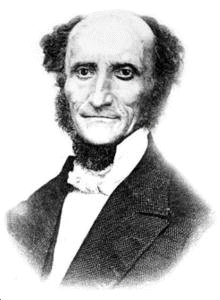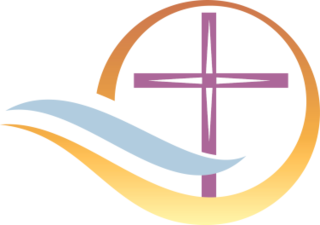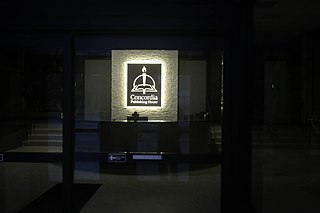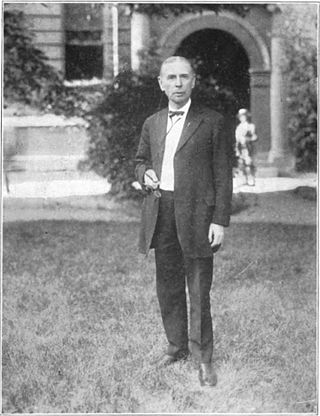Related Research Articles

The Lutheran Church – Missouri Synod (LCMS), also known as the Missouri Synod, is an orthodox, traditional, confessional Lutheran denomination in the United States. With 1.7 million members as of 2022 it is the second-largest Lutheran body in the United States, behind the Evangelical Lutheran Church in America. The LCMS was organized in 1847 at a meeting in Chicago, as the German Evangelical Lutheran Synod of Missouri, Ohio, and Other States, a name which partially reflected the geographic locations of the founding congregations.

Carl Ferdinand Wilhelm Walther was a German-American Lutheran minister. He was the first president of the Lutheran Church – Missouri Synod (LCMS) and its most influential theologian. He is commemorated by that church on its Calendar of Saints on May 7. He has been described as a man who gave up his homeland for the freedom to speak freely, to believe freely, and to live freely, by emigrating from Germany to the United States.

The American Association of Lutheran Churches is a Lutheran church body based in the United States. It was formed on November 7, 1987, as a continuation of the American Lutheran Church denomination, the majority of which merged with the Lutheran Church in America and the Association of Evangelical Lutheran Churches to form the Evangelical Lutheran Church in America. The AALC offices were originally in Bloomington, Minnesota. The national office moved to Fort Wayne, Indiana, in 2007, and to Saint Paul, Minnesota, in 2022. In 2008, it had 67 congregations, with about 16,000 members. In 2020, the denomination listed 59 congregations. Its current Presiding Pastor is the Rev. Dr. Cary G. Larson.

Concordia Theological Seminary is a Lutheran seminary in Fort Wayne, Indiana. It offers professional, master's degrees, and doctoral degrees affiliated with training clergy and deaconesses for the Lutheran Church–Missouri Synod (LCMS).

Bethany Lutheran College (BLC) is a private Christian liberal arts college in Mankato, Minnesota. Founded in 1927, BLC is operated by the Evangelical Lutheran Synod. The campus overlooks the Minnesota River valley in a community of 53,000.

Concordia Seminary is a Lutheran seminary in Clayton, Missouri. The institution's primary mission is to train pastors, deaconesses, missionaries, chaplains, and church leaders for the Lutheran Church–Missouri Synod (LCMS). Founded in 1839, the seminary initially resided in Perry County, Missouri. In 1849, it was moved to St. Louis, and in 1926, the current campus was built.

Seminex is the widely used abbreviation for Concordia Seminary in Exile, which existed from 1974 to 1987 after a schism in the Lutheran Church–Missouri Synod (LCMS). The seminary in exile was formed due to the ongoing Fundamentalist–Modernist Controversy that was dividing Protestant churches in the United States. At issue were foundational disagreements on the authority of Scripture and the role of Christianity. During the 1960s, many clergy and members of the LCMS grew concerned about the direction of education at their flagship seminary, Concordia Seminary, in St. Louis, Missouri. Professors at Concordia Seminary had, in the 1950s and 1960s, begun to utilize the historical-critical method to analyze the Bible rather than the traditional historical-grammatical method that considered scripture to be the inerrant Word of God.
Bethany College may refer to:

The Evangelical Lutheran Synod (ELS) is a US-based Protestant Christian denomination based in Mankato, Minnesota. It describes itself as a conservative, Confessional Lutheran body. The ELS has 130 congregations and has missions in Peru, Chile, India, South Korea, Ukraine, Czech Republic, and Latvia.

The Concordia Lutheran Conference (CLC) is a small organization of Lutheran churches in the United States which formed in 1956. It was a reorganization of some of the churches of the Orthodox Lutheran Conference (OLC), which had been formed in September 1951, in Okabena, Minnesota, following a break with Lutheran Church–Missouri Synod (LCMS). It is the remaining successor of the Orthodox Lutheran Conference. The current president is David T. Mensing, pastor of Peace Evangelical Lutheran Church in Oak Forest, Illinois. All members of the board of directors serve one year terms. The CLC has five congregations and is in fellowship with nine mission congregations in Russia and Nigeria.

Jaroslav Jan Pelikan Jr. was an American scholar of the history of Christianity, Christian theology, and medieval intellectual history at Yale University.

Concordia Publishing House (CPH), founded in 1869, is the official publishing arm of the Lutheran Church–Missouri Synod (LCMS). Headquartered in St Louis, Missouri, at 3558 S. Jefferson Avenue, CPH publishes the synod's official monthly magazine, The Lutheran Witness, and the synod's hymnals, including The Lutheran Hymnal (1941), Lutheran Worship (1982), and Lutheran Service Book (2006). It publishes a wide range of resources for churches, schools, and homes and is the publisher of the world's most widely circulated daily devotional resource, Portals of Prayer. Its children's books, known as Arch Books, have been published in millions of copies. Concordia Publishing House is the oldest publishing company west of the Mississippi River and the world's largest distinctly Lutheran publishing house.
Jacob Aall Ottesen Preus II was an American Lutheran pastor, professor, author, seminary president and church denominational president. He served as the eighth president of the Lutheran Church–Missouri Synod (LCMS) from 1969 to 1981. He was a major figure in the "Seminex" theological/political controversy, which resulted in a schism in the LCMS during the early 1970s.

Franz August Otto Pieper was a Confessional Lutheran theologian who also served as the fourth president of the Lutheran Church – Missouri Synod, known at that time as the German Evangelical Lutheran Synod of Missouri, Ohio, and Other States.

Oswald Carl Julius Hoffmann was an American clergyman and broadcaster who was best known as a speaker for The Lutheran Hour, a long-running radio program affiliated with the Lutheran Church–Missouri Synod (LCMS). During his time on the Lutheran Hour, the weekly broadcast was heard on 1,200 stations in the U.S. and in thirty other nations.
Ulrik Vilhelm Koren was a Norwegian-American author, theologian and church leader. A pioneer Lutheran minister, he played a significant role in the development of the spiritual and intellectual development of Norwegians in America. Ulrik Vilhelm Koren has been called the "patriarch of Norwegian American Lutherans."

Robert David Preus was an American Lutheran pastor, professor, author, and seminary president.
Lutheran Brethren Seminary (LBS) is an institute of theological higher education of the Church of the Lutheran Brethren of America (CLBA), located in Fergus Falls, Minnesota. It shares its campus with the denominational headquarters of the CLBA and the denomination’s high school, Hillcrest Lutheran Academy. The seminary’s primary mission is to train and equip pastors, missionaries, and Christian lay workers for ministry in the Church of the Lutheran Brethren and other church bodies.
Robert Harry Smith was a Lutheran clergyman, theologian, prolific author and lecturer on the Bible's New Testament, and dean of a Lutheran seminary in exile in the early 1980s. Smith was one of 40 faculty members from the Lutheran Church–Missouri Synod's Concordia Seminary in St. Louis, Missouri who walked out in 1974 in a theological dispute that ended with the ousting of Concordia's president, John Tietjen, who disagreed with a literal reading of the Bible.
References
- ↑ "History". Bethany Lutheran Theological Seminary. Retrieved November 21, 2022.
- ↑ "President". Bethany Lutheran Theological Seminary. Retrieved November 21, 2022.
- ↑ "Catalog". Bethany Lutheran Theological Seminary. Retrieved November 21, 2022.
- ↑ Schmeling, Gaylin (2021). Sent by the Shepherd: Seventy-Five Years at Bethany Lutheran Theological Seminary. Mankato, MN: Bethany Lutheran Theological Seminary Press. p. 171. ISBN 9780931057021.